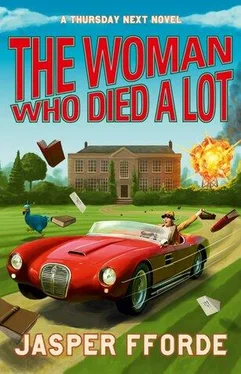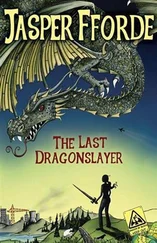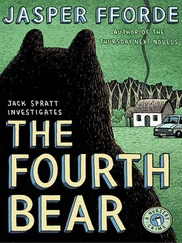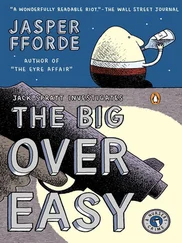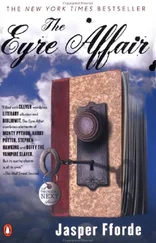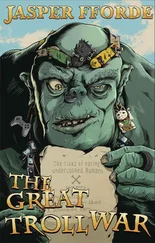“I don’t know. Probably not.” He looked at his watch. “What time are you meeting with Braxton?”
“As soon as I’ve had the psychological evaluation.”
“I thought you’d have to be a bit nuts to want to run SO-27,” mused Landen.
“Undoubtedly,” I replied, “but it’s not so much a question of how mad applications for the job might be as the style of madness. Obsessive drive is probably good, speaking in tongues and shouting at the walls less so.”
“Do you think Phoebe Smalls has the requisite loopiness to get the job?”
Detective Smalls, it should be noted, was the only other person who could realistically lead the re-formed Literary Detectives division. She was good, but then so was I.
I thought for a moment. “Perhaps. She applied for the job, after all—no-one would do that unless a little bit odd.”
“She hasn’t got your experience,” said Landen. “Running SO-27 isn’t for tenderfoots.”
“But she’s got the youth, ” I replied, “and her health.”
“Phoebe Smalls might look a sound bet on paper,” he replied, “but when weird comes knocking, gray hairs count. Braxton knows this. Besides, the boss need never leave the office. Consign the running around to the young pups.”
He smiled at me, but he knew I wasn’t happy. I had yet to walk without a stick, or pain. My broken femur had knit badly in the two weeks before I was found following my accident, and it had to be broken and reset with pins, which is never satisfactory. I wasn’t particularly worried; running is overrated anyway, and sport only makes you sweaty and smug and wears out the knees. Besides, Landen had been missing his leg above the knee for longer than he hadn’t, and he was fine. In fact, since he had a left limp and I had a right one, if we walked side by side, it apparently looked quite comical. I told Tuesday we were her “cute cripple parents,” and she retorted that “cripple” wasn’t really a polite term, and I told her that since my leg got mashed, I could define myself in any way I chose. In answer to that, she huffed, glared and then pouted, as teenagers are wont to do.
“She’s right,” Landen had remarked when I told him. He’d lost his leg to a land mine in the Crimea almost three decades before and referred to himself as either a “deconstructed bipedalist” or, more simply, “a man unjustly overcharged for socks.” “Will you be okay?” he asked now.
“I’m fine,” I told him, “with a stick to lean on and four Dizuperadol patches.”
“Four?” said Landen. “Are you sure that’s wise?”
“It’s the only thing that seems to have any lasting effect. Slow and constant release—double thickness, too.”
I’d recently moved to the more effective stick-on patches rather than Dizuperadol taken orally. The patches seemed to work for longer, and I’d been prescribed the double-strength ones. Sometimes it felt like I had a waffle stuck to my bum. They were effective, but there were side effects.
“How’s the vision?” asked Landen.
“In focus more often than it’s not. And that’s good, right?”
“A Zen dog dreams of a medium-size bone.”
“Actually, there is one thing you could do. Can you put my all phone in my right pocket so I can get it out?”
Landen did as I asked. I’d been working on the grip of my left hand, but it was slow going. The damage to my hand had been caused by the taxi’s indicator stalk as it passed through my forearm during the vehicle’s sudden stop in the swamp, and it had caused all sorts of mayhem on the way. The stalk broke off when it hit my jaw. These days I used it as a tea stirrer. The stalk, that is, not my jaw.
“I’ll meet you in TJ-Maxx around two,” said Landen, giving me an affectionate nuzzle. “And don’t be too mean with the shrink, will you? They’ve got feelings, too.”
“I’ll play nice. What’s the password this time?”
For a few years now, Goliath had been sending Synthetic Thursdays out into the world to try to get information from people who would speak only to me—Landen being an obvious example. They had also tried to gain access to my house, to the SpecOps records department, and they’d even tried to scam a free membership at a health farm. The copies were initially crude but had made steady and sustained advances in sophistication since first appearing a eighteen months before. The Mark IVs and Vs wouldn’t have fooled anyone, but the Mark VIs were impressive and had been able to crack single code words, which was why we used the more cloak-and-daggerish sentences and responses.
“What about if I say, ‘No cookies at the hunt, sir!’ and then you reply with, ‘It’s not a cookie, it’s a Newton’?”
“Sounds random enough.”
So with the passwords committed to memory, we limped off in opposite directions. I turned once to take a look at him, and he turned as well, and we smiled a simple smile of understanding. Parting for us was generally sweet sorrow, as past experience had taught us there was a fair possibility we might not see each other for a while, if at all—a state of affairs for which I took full responsibility. Sadly, a lifetime in law enforcement tends not to create a bunch of grateful villains happy that you have shown them the error of their ways, but rather a lot of disgruntled ne’er-do-wells eager for payback.
I hobbled across the pedestrian walkway and passed beneath the shadow of Swindon’s centrally located anti-smite tower, the primary defense against God’s planned cleansings of the sinful. I stopped to stare for a moment at the sixty-foot tower. It looked like an electricity pylon topped with a domed metallic mushroom. The burnished copper sheathing glowed in the sun, and even though the many towers dotted about the country were mechanically complete, there were still several hurdles to overcome. The software regulating the 8.2 million independently controlled lasers inside the dome had yet to be fine-tuned, and until it was, the defense shield remained nonoperational.
Perhaps the members of the city council wasn’t so bothered about Swindon’s smiting because they’d convinced themselves the tower would be running in good time to deflect the wrath of the Almighty four days from now. I didn’t think it would, and with good reason: I knew the genius behind the technology, and despite much midnight oil, the Anti-Smite Defense Shield remained firmly on the theoretical side of reality.
I hurried on, past the Thistle Hotel to my right, and presently found myself outside the front entrance of the Wessex Special Operations headquarters.
The SpecOps division most associated with Thursday Next was SO-27, the Literary Detectives. It was their job to protect the citizenry against literary fraud, overenthusiastic interpretations of protected plays and the illegal trade in bogus Shakespeareana. Miss Next joined in the Swindon branch in 1985, not long before the adventure that came to be known as the Eyre Affair. She worked there on and off in various capacities until disbandment in 1991 and was always suspected of continuing her job under the radar in the years since.
Millon de Floss,
The Thursday Next Chronicles
The offices had survived almost completely unchanged since most of the Special Operations Network was disbanded thirteen years before. The building was of a sensible design from the forties, and the worn wood and eroded stonework contained more memories than any other place in my life, with the possible exception of the Jurisfiction offices at Norland Park. I pushed open the heavy doors and walked into the lobby. High above me a glazed ceiling let in a directionless gray light and, by the look of it, some rainwater. The paint was peeling, and there was the ever-present smell of damp carpets and boiled cabbage—or, if you prefer, boiled carpets and damp cabbage.
Читать дальше
